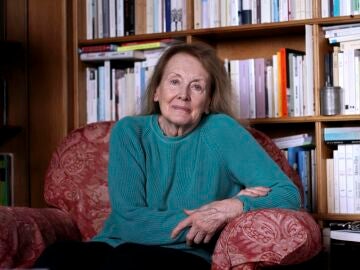
the french writer annie ernaux he did not write for a reward, as he confessed to now what leo. But he has obtained it. She has been awarded the Nobel Prize for Literature 2022 for “the courage and clinical acuity with which he discovers the roots, the strangers and the collective restrictions of personal memory,” according to the Swedish academy’s Twitter account.
This courage has been embodied in his more than 20 worksa literature in which he embarked with only 20 years. In fact, his works are inspired by their private diaries. Some notebooks that she used to seek help. Or to avenge her race, as she herself confessed to the literary portal. In this way, she has managed to position herself as one of the most followed voices on the contemporary french literature. The reason? His intimate, critical and sincere work.
A proof of this is ‘The frozen woman’, a story with which any woman of today feels identified. Those who fight against the patriarchal society. In this case, the proper name is that of a 30 year old teacher which embodies the problem of false family conciliation and the irremediable loss of identity. But it is not the only book of his translated into Spanish by the Cabaret Voltaire publishing house.
They have recently published the writer’s first novel: “The empty cabinets”, the story of a social rupture. The protagonist, a teenager, finds herself trapped between the world of her parents, proletarian and poorly educated, and that of the bourgeoisie, educated and with access to culture, according to advances from the publisher’s website.
Annie Ernaux Titles
- ‘Les armoires vides’ (‘The empty cupboards’).
- ‘Une femme’ (‘A woman’, 1989), where she narrates the life of her mother. She got the Gregor von Rezzori award,
- ‘La place’ (‘The place’, 1983, Renaudot award 1984), about the social rise of his parents.
- ‘La honte’ (‘The Shame’, 1997), about the social ascent of his parents.
- ‘Ce qu’ils disent ou rien’ (1997), about his teenage years.
- ‘La femme gelée’ (‘The Frozen Woman’, 1981), about her marriage.
- ‘L’événement’ (‘The event’, 2001), about her abortion. One of his most translated books into other languages.
- ‘Je ne suis pas sortie de man nuit’ (‘I haven’t left my night’, 1997), where he recounts his mother’s Alzheimer’s.
- ‘L’usage de la photo’ (‘The use of photography’, 2005), which helped her talk about her breast cancer.
- ‘Passion simple’ (‘Pure passion’, 1992).
- ‘Journal du dehors’ (1993).
- ‘Je ne suis pas sortie de man nuit’ (‘I haven’t left my night’, 1997).
- ‘La vie extérieure’ (‘Outdoors’, 2000).
- ‘Se perdre’ (‘Lost’, 2001).
- ‘L’occupation’ (‘The occupation’, 2002).
- ‘L’écriture comme un couteau’ (‘Writing like a knife’, 2003) with the French writer Frédéric-Yves Jeannet.
- ‘Les Années’ (‘The Years’, 2008). She received in 2008 the Marguerite Duras Prize and the European Strega and the François-Mauriac.
- ‘L’Autre fille, Nil’ (‘The other daughter’); ‘L’Atelier noir’ (‘The black workshop’) and ‘Écrire la vie’ (‘Writing life’).
- ‘Regarde les lumières mon amour’ (‘Look at the lights, my love’), which was released in 2014.
- ‘Journal du dehors’ (‘Diary from the outside’), where he recounts scenes he witnesses while walking through the streets of Cergy-Pontoise.
- ‘Memoire de fille’.
- ‘Hôtel Casanova et autres textes bref’ (2020).
Source: Lasexta
Ricardo is a renowned author and journalist, known for his exceptional writing on top-news stories. He currently works as a writer at the 247 News Agency, where he is known for his ability to deliver breaking news and insightful analysis on the most pressing issues of the day.











